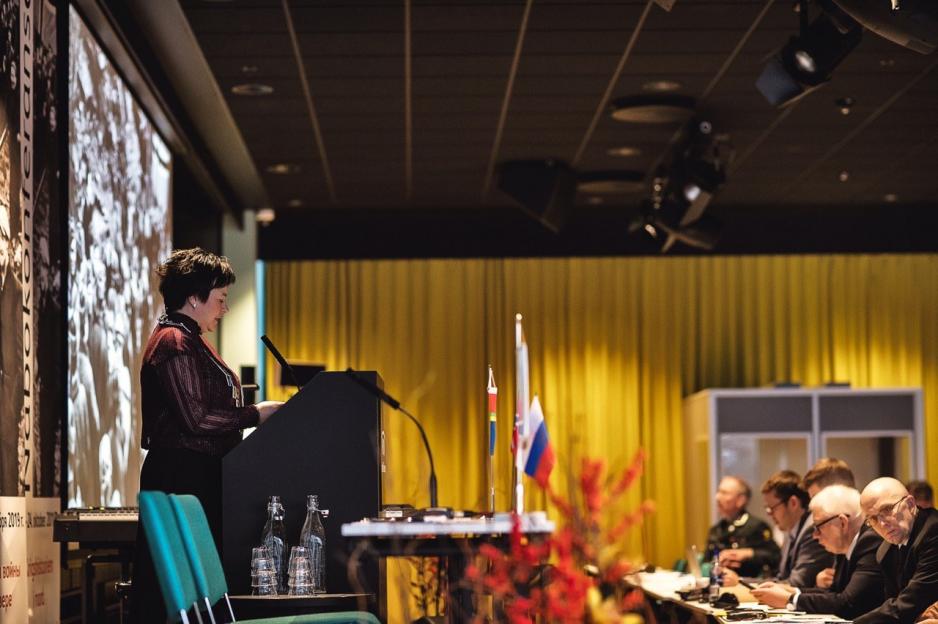A Good Meeting Between Norway and Russia Mixed With A Portion of County-Political Naivety

Finnmark County Councilor Ragnhild Vassvik (Labor) demonstrated in the debate that she is a clear fan of lifting the western sanctions against Russia. Photo: Maksim Malyutin
At the time of writing, the hallways of hotels in Kirkenes are filled with security officers. In the air outside, seagull cries are replaced with the sound of helicopters. A king, a prime minister, a couple of foreign ministers from Russia and Norway, as well as a couple of defense ministers form the same countries, are heading to the High North border town.
KIRKENES: For two days, the town has been warming up before the 75th anniversary of the liberation of Finnmark. It has done so by organizing a neighbor conference, a combination of historical analyses and an attempt to find a way forward for two neighboring countries.
Informative and important
The neighbor conference, a collaboration between Finnmark County Council, the Barens Secretariat and UiT Norway’s Arctic University, has a good name for a knowledge-based meeting between Russians and Nowegians, just a couple of miles from the border at Storskog, outside Kirkenes.
It has been an informative conference. An important conference. Yet also a meeting that sparks afterthoughts.
Informative, because the writing of history is continually revised and reworked. With a 74-year long distance to the withdrawal of the Soviets in the fall of 1945, after liberating Finnmark from German occupation forces the year before, those who study history keep finding new angles through which to understand both the larger picture as well as the fate of individuals.
Important, because it reminds us that the border between Norway and Russia is a peaceful one. That is a rather notable exception along the borders of the Soviet Union and Russia. We should be on guard against basing our security policy analyses on conflicts elsewhere in the world. Not all experiences are transferable from southern to northern borders.
And then there’s the afterthought
It is also a conference that sparks afterthought, for a number of reasons.
Primarily because security policy thinking has gradually gained prominence as guiding principle for developments in the High North. Civilian projects are pushed aside, and military strategies and solutions are prioritized.
That became evident during the last day of the neighbor conference, the day that was meant to and did point forward. Whether the discussion was about relations between Norway and Russia, business cooperation between our two countries, or future scenarios for Europe and the High North, 2014 was there as a key premise for the debate.
The Russian annexation of the Crimea, and the subsequent international sanctions, have characterized developments from 2014 up until today. It also characterized the meetings in Kirkenes.
Violations of regulations and mutual suspicions have replaced a world order that for some time was rather straightforward. At the same time, both the conference as well as the planned political top-level meetings stress a desire to move on. The western discussions about sanctions have, for obvious reasons, a different character than they did back in 2014.
Raising questions about the effect and goals of the sanctions is legitimate. It is necessary to discuss the way forward, however, the choice of direction should not include an acceptance of public international law violations.
Because that, too, was included in the neighbor conference based on knowledge and insights.
County politics gone astray
Finnmark County Councilor Ragnhild Vassvik (Labor) demonstrated clearly in the debate that she is a fan of lifting the western sanctions against Russia. That is a legitimate view, in and of itself. However, her reasoning is both terrifying and provoking. According to Vassvik, the sanctions were introduced due to Russia’s violation of human rights.
Thus, she said from the podium, the USA should also be punished for its policy against Mexico.
This goes to show how a publicly elected official may go astray in the lack of principal thinking mixed with political naivety.
The sanctions were not introduced due to human rights violations, but because of violations of public international law.
If you are a publicly elected official and want to fight the sanctions, it is only fair to demand that you know why they were introduced. Vassvik was firmly put in place by her party colleague, Chairperson of the Parliament’s Standing Committee on Foreign and Defense Policy, Anniken Huitfeldt, as well as by State Secretary Audun Halvorsen of the Foreign Ministry.
St. George’s order
At the same time, the audience included Finnmark politicians who had adorned themselves with the symbol-loaded ‘Ribbon of St. George’. Few know what this ribbon symbolizes, perhaps not even those who had put it on their collars. The symbol is banned in the Ukraine and used amongst Russian nationalists as support to – exactly – the annexation of the Crimea.
The Order of St. George is also more or less mandatory on the uniform collars of separatist soldiers at war in eastern Ukraine.
Ragnhild Vassvik and those sharing her political views add an extra dimension to Norwegian foreign policy when they appear to attempt to try and push sanction politics into a battle between Finnmark and the rest of the country.
The people of Finnmark deserve that least of all, the very ones who have been at the forefront of dialogue between Norway and Russia.
The neighbor conference that closed Thursday afternoon in Kirkenes was a successful and future-leaning prolonging of this work, precisely because it was based on knowledge and experience – not political activism and emotions.
This op-ed was originally published in Norwegian and has been translated by HNN's Elisabeth Bergquist.

